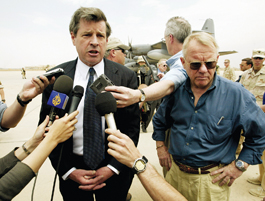home | metro silicon valley index | movies | current reviews | film review

Courtesy Magnolia Pictures
Mistakes were made: Ambassador Paul Bremer and Gen. Jay Garner meet the press in 'No End in Sight.'
Stuff Happens
Charles Ferguson's documentary explains why there is 'No End in Sight' for America and Iraq
By Richard von Busack
MAYBE IT isn't fair, but in my heart I blame Steven Spielberg for all of this. Saving Private Ryan was an unbeatable combination of the technology that turned World War II into a video game with a sweeter corn syrup than was ever rationed out to wartime audiences. From that movie on, you could feel the change in the air; when World War II was spoken of, it was never in terms of Never Again. It was more in terms of, Granddad had a Good War. Where's mine?
Those who led us into Iraq pimped that parallel with the Good War. Those who advised waiting for more info were made into Neville Chamberlains, appeasing the Hitler of the Euphrates. Hoping to repeat tragedy as spectacle, the Bush administration set the stage for years of unending horror. And now the movie-made mess is examined in a movie, a documentary of great conciseness and intelligence, No End in Sight.
Director Charles Ferguson didn't get to talk to the architects of the war: Bush, Cheney, Rumsfeld, Rice and Wolfowitz. Since they declined to be interviewed, he is left with the unanswered question: How could they be so utterly lacking in foresight? How could they refuse to recognize the catastrophe and then try to laugh it all off like sportsmen who had lost a bet?
How can you make as much money and have as much prestige as Donald Rumsfeld made and had and still brush off anyone bringing you bad news as a Chicken Little? We see Rumsfeld's act reprised at the famous April 11, 2003, press conference. Using that gruff yet chuckling mannerism that the press ate up with a spoon, Rumsfeld tells the world that shit happens—even if he has to use the polite euphemism "stuff."
Since we're not yet able to crack the mind-set of these five, "shit happens" may be the only way to explain this epic bungle. We'll all have to wait for their self-justifying memoirs, I guess.
Having to do the detective work himself, Ferguson pinpoints the moment in which the war was well and truly lost. Clearly, that moment was May 2003, the date when Paul Bremer of the Coalition Provisional Authority implemented the administration's de-Baathification plan. This made hundreds of thousands of Iraqis jobless, including hordes of minor Baath Party members (including "children's librarians," claims Samantha Power, author of A Problem From Hell). It also meant the dismissal of soldiers who could have brought order to Iraq when there was still order to be had.
The U.S. Army's Col. Paul Hughes, interviewed here, tells tragic stories of the Iraqi officers begging to be allowed to stop the looting of Baghdad. Meanwhile, the U.S. Army advised against the drastic purge, but it didn't get a vote. Understaffed and undersupplied, the American soldiers tried to keep order as the situation deteriorated. Saddam opened the prisons before he ran for it, leaving 100,000 criminals free—more than a few of them the apolitical and violent kind.
Unguarded weapons depots were ransacked by the mob. The CPA—it stands for "Can't Produce Anything," according to Thomas E. Ricks' book Fiasco—crouched behind seven miles of blast walls. Paul Bremer, the wizard of this Oz, addressed the world through a press spokesman who didn't know how to speak Arabic. The offices inside were staffed with an ever-rotating cast of recently graduated Republican donors' kids. "Pretty boys," Hughes calls them.
Rumsfeld clowned. The intellectually lazy president strutted through his photo opportunities, repeating the prediction that dead-enders were in their last throws of resistance. He had the reports that proved otherwise, though. As we see here during a Sept. 21, 2004, press conference—and it's evidence that's as damning as Bush's moment of cataleptic stillness in Fahrenheit 9/11—he hadn't bothered to read even the bullet points on the one-page summary of the reports brought to him.
More than any other documentary yet, No End in Sight is The Dummy's Guide to the Iraq War. It is a lean, rigorously researched film. Ferguson interviews reporters like George Packer (The Assassin's Gate), as well as former officials like Richard Armitage and two members of the National Intelligence Council, which coordinates the information our leaders would rather not read. Campbell Scott's sober narration and Peter Nashel's ominous music advance the action.
Since this documentary is a few months old, it doesn't record the most recent numbers: 4,000 soldiers of the Mother of All Coalitions dead, of which nearly 3,600 were ours. Ferguson estimates the long-term bill to be in the end about $1.8 trillion. That doesn't include the possibility of failure, of some cleric becoming the new Saladin and holding the West over an oil barrel.
What can we do? As Ricks writes, reusing a World War I allusion, we have an army of lions led by donkeys. The Greeks had a specific goddess of folly, called Ate, to blame it all on, a daughter of Zeus who alighted on men to derange them and lead them into self-destruction. Ate's handymen and women made Iraq her shrine.
![]() No End in Sight (Unrated; 102 min.), a documentary by Charles Ferguson, opens Aug. 17 at selected theaters.
No End in Sight (Unrated; 102 min.), a documentary by Charles Ferguson, opens Aug. 17 at selected theaters.
Send a letter to the editor about this story.
|
|
|
|
|
|